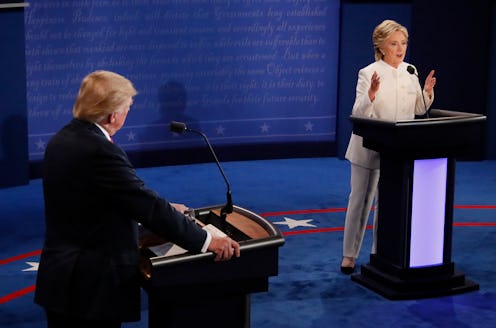No matter who you're planning on voting for on Nov. 8, Election Day is constantly on our collective minds these days. But while the biggest concerns are likely to do with policy, voter registration, and the logistics of actually making it to our local polls, it's also super interesting to think about election day facts from history. Considering that this year's Election Day is historic for a variety of reasons already and it hasn't even happened yet, thinking back on how the day we vote has changed over the years can provide an additional level of perspective. I mean, regardless of you're voting for, it's pretty darn amazing that we have our first female Presidential nominee from a major party; that's definitely something which will go down in history.
In fact, it can be really intriguing to think about where our customs and social norms come from in general. We tend to assume that certain ways of life have just always been that way, but especially when we're looking back through a long period of history, it can be truly fascinating to see how things have changed (or not). And hey, even if you aren't a self-proclaimed history buff, we all know that we'll be talking about nothing except for the Presidential election for the coming weeks, right? The debates may be over, but the main event is still to come.
So, you might as well have some Election Day trivia to break out when things get a little too heated around the dinner table. Right? Right.
We Vote In November Because We Fear The Cold
Have you ever stopped to wonder why Election Day is always in November? According to Holly Yan at CNN, it all goes back to the weather. Seriously: People were usually super busy during harvest season earlier in the fall, but in later months, harsh winter weather made travel a serious challenge (because remember, people were traveling via horses and on foot just to vote!). As such, November, which falls between those two problematic times, became the most agreeable month of the year.
We Vote On Tuesdays Because Of Religion And Farmer's Markets
Yan further explains why Tuesday made a lot of sense for most of the population back in the 1800s, even though it is a bit of a head-scratcher today. Attending some sort of religious worship on Sundays was the norm for those who were allowed to vote (that is, white Christian men), so the thought of voting on Sunday was definitely a taboo. People also had to work in travel time, so Monday was out. And Wednesday? Those were traditionally harvest days. So Election Day on Tuesday it was, and still is.
You Used To Be Able To Buy Votes With Alcohol
While this is obviously a big no-no today, politicians used to be able to literally supply alcohol for voters as an incentive not only to vote, but to vote for them specifically. As the National Constitution Center (NCC) staff explains, our very first president, George Washington, did this himself when he "spent his entire campaign budget, 50 pounds, on 160 gallons of liquor served to 391 voters."
In Years Without Federal Elections, States Can Vote On Different Days
When it comes to local elections (e.g. the ones that don't involve electing President of the United States), states don't actually have to vote on the day marked as Election Day. Some states can opt to vote on a different day, often later in the month of November, if they choose.
We Used To Vote Without Seeing Our Candidates In Real Life
Sure, we're well accustomed to watching our presidential candidates in real time when it comes to the Presidential debates, as well as seeing their commercials, media appearances, and public speaking events all over the place. Prior to the first live presidential debate between President Kennedy and Richard Nixon in 1960, though, people listened to the debates on the radio and read about the candidate's policies in the paper. So unless you were lucky enough to catch someone on the campaign trail, you were voting on Election Day without actually laying eyes on them in real life. Weird, right?
Gone Are The Days of Pulling A Lever
According to the NCC staff via Yahoo!, the "classic" mechanical voting lever was phased out in 2010. Pretty much all states now have you vote via an electronic digital voting machine or via paper ballot, as some locations optically scan votes.
Images: Giphy (6)
